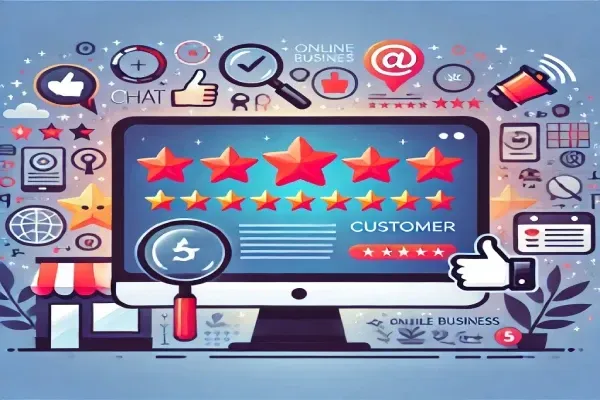
The Importance of Online Reputation Management for Small Businesses
The Importance of Online Reputation Management for Small Businesses
I. Understanding Online Reputation Management (ORM)
A. Definition of Online Reputation Management
Online Reputation Management (ORM) is the process of keeping an eye on, controlling, and influencing a person's or company's online image. It involves tracking what people are saying about a company on different platforms, answering comments, and using strategic communication to project a positive image.
B. How ORM has Progressed in the Digital Environment
ORM has changed dramatically as social media and the internet have grown in popularity. Businesses used to build their reputations through standard marketing and word-of-mouth. These days, the image of an organization is significantly affected by search engine results, social media interactions, and online reviews. As a consequence of this change, ORM has become an essential part of every business plan, particularly for startups with little funding.
C. Essential components of ORM Strategies
Typical examples of successful ORM tactics include:
Monitoring: Keeping track of mentions, reviews, and comments across various platforms.
Engagement: Responding to both positive and negative feedback in a timely manner.
Content Creation: Producing high-quality content that reflects the brand's values and engages the audience.
Crisis Management: Having a plan in place to address any negative publicity or reviews.
II. Why Online Reputation Matters
A. Consumer Trust and Decision-Making
Before making a purchase in the current digital era, customers frequently consult internet evaluations and ratings. A positive online reputation can significantly influence their decision-making process. Studies show that a significant portion of consumers place an equal amount of faith in online reviews and personal recommendations, which makes ORM essential for small firms trying to gain the trust of prospective clients.
B. The Role of Reviews and Ratings
An essential part of a company's internet reputation are reviews and ratings. They have an effect on customer perceptions in addition to search engine rankings. While negative feedback can turn off potential consumers, a small business with a high rating and positive reviews is more likely to draw in new business.
C. The Influence of Social Media on Reputation
For small businesses, social media platforms are a double-edged sword. They give businesses a chance to interact with customers and showcase their products, but they also put them under public criticism. Small businesses must actively manage their social media presence because one negative comment can become viral very rapidly.
III. Common Challenges Small Businesses Face in ORM
A. Managing Negative Reviews and Feedback
Dealing with negative feedback is one of the most challenging issues small businesses experience. Whether or whether the criticism is justified, it can affect a company's reputation for a long time. In order to minimize harm and demonstrate to prospective clients that the company appreciates feedback, it is essential to react suitably and properly.
B. The Difficulty of Monitoring Online Presence
For small business owners, keeping an eye on their internet presence can be daunting considering the abundance of venues available for consumers to voice their opinions. Sometimes small businesses may lack the time and effort necessary to monitor mentions on review sites, forums, and social media.
C. Limited Resources and Budget Constraints
Small businesses often operate with limited resources, making it difficult to allocate funds for ORM efforts. This can lead to a reactive rather than proactive approach, which may not effectively manage their online reputation.
IV. Effective Strategies for Managing Online Reputation
A. Proactive Monitoring and Response Techniques
Implementing tools that monitor online mentions can help small businesses stay ahead of potential issues. Regularly checking review sites and social media can allow businesses to respond quickly to feedback, showing customers that their opinions matter.
B. Encouraging Positive Customer Feedback
Encouraging satisfied customers to leave positive reviews can help balance out any negative feedback. Simple strategies, such as follow-up emails or in-store prompts, can remind customers to share their experiences online.
C. Building a Strong Online Presence through Content
Creating valuable content that resonates with the target audience can enhance a business's online reputation. This could include blog posts, videos, or social media updates that showcase the business's expertise and commitment to customer satisfaction
V. Assessing the Outcomes of ORM Initiatives
A. Key Performance Indicators (KPIs) for ORM
To assess the effectiveness of ORM strategies, small businesses should track specific KPIs, such as:
Review Ratings: Average rating across platforms.
Volume of Reviews: Number of reviews received over time.
Engagement Metrics: Likes, shares, and comments on social media posts.
B. Tools and Resources for Tracking Reputation
Small firms may keep an eye on their internet reputation with the use of a variety of tools. Tools such as ReviewTrackers, Hootsuite, and Google Alerts can give you information about what people are saying about your company online.
C. Adjusting Strategies Based on Feedback and Data
Regularly reviewing feedback and data can help small businesses refine their ORM strategies. By understanding what works and what doesn’t, businesses can make informed decisions to improve their online presence.
Conclusion
In the current digital environment, online reputation management is essential for small enterprises. Increased consumer trust, improved decision-making, and eventually more sales can result from having a positive internet reputation.For small firms, investing time and resources in ORM can yield substantial returns. Small businesses may create and preserve a reputation that draws in and keeps clients by actively managing their internet presence, answering comments, and promoting favorable reviews.

